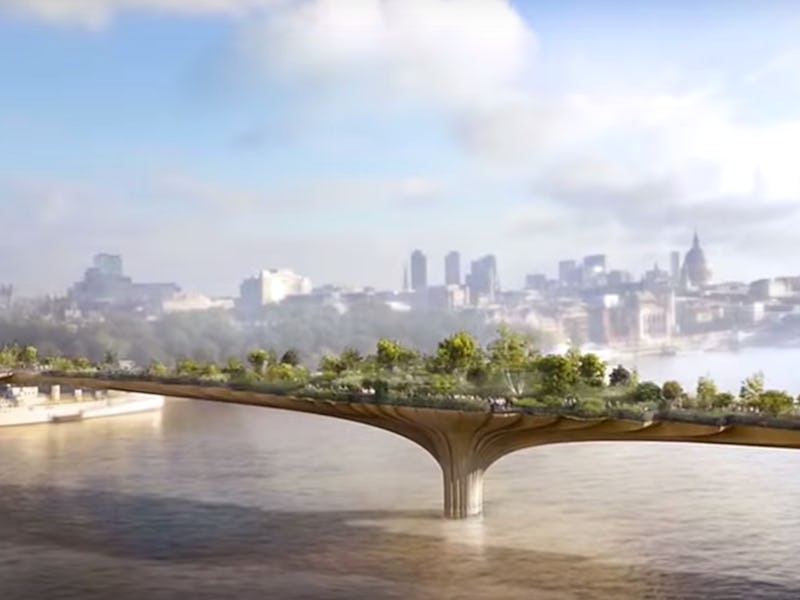London's Controversial Garden Bridge Gets Support From a New Political Power
London's new mayor backs the bridge.

Extensive urban construction projects tend to spark controversy, especially when taxpayers are funding it. Such is the case with London’s Thames-spanning garden bridge, a source of tension since its conception in 2012.
London’s newly elected mayor Sadiq Khan supports the £175 million project, but he’s taking steps to alleviate tensions by meeting taxpayers and the Garden Bridge Trust halfway with a list of demands.
First and foremost, Khan emphasized the importance of making the garden bridge a public space, which would reverse some of the steps the previous administration took to privatizing it. For example, the bridge is expected to close for 24 hours at a time for private fundraising events, but Khan proposes that the bridge close for less time during these events so as to eschew an air of exclusivity.
An artist's impression of the garden bridge
To further promote the bridge as a public space, Khan wants to encourage children from schools on either side of the bridge to get involved in planting and maintenance on the bridge. He also hopes that the garden bridge will collaborate with other parks in London to spread the plants and seeds that will be grown on the bridge.
So far the GBT is on board with a majority of Khan’s requirements, aside from the fact that the bridge may need to close during private fundraising events for longer than Khan wants, as the project will cost £2 million a year to sustain. A GBT spokesperson says, “We welcome the mayor’s support and look forward to working with him and his team to make the beautiful garden bridge happen and deliver its many benefits to millions of Londoners and visitors to the city.”
Artist's rendering of London's garden bridge
Khan replaced Boris Johnson as the mayor of London, whose administration came under fire for concealing the details of the project from the public. In response, Khan published the complete business plan to show he has nothing to hide. “I am determined to run the most open and transparent administration London has ever seen. I will let the sunshine in,” Khan said.
Khan’s push for transparency follows years of mounting tensions against the garden bridge that arose when the project was first conceived in 2012. The procurement process for the bridge’s main designer, Thomas Heatherwick, has become a central point of controversy, for example. In early 2013, Transport for London held a publicly-funded design competition, but Heatherwick had already met with Johnson on five different occasions prior to the competition, which has led to the public to assume Heatherwick was unfairly favored to helm the project.
An artist's rendering of one end of the garden bridge in London
The fundraising aspect of the project has also been a major source of contention. Despite insisting that “maintenance costs will not be borne by the public sector,” Johnson used somewhere between £40 and £60 million from public funds to move ahead with financing the project while he was in office. Furthermore, a council member on the Lambeth council was allegedly told by the Transport for London that there would be financial repercussion if Lambeth did not back the project. News that visitors to the bridge garden will be tracked by their mobile phones and watched by an extremely strict security staff that reserves the right to seize and destroy harmless items like guitars and kites has predictably exacerbated tensions too.
Johnson’s administration has left Khan with plenty of reparations to make, but Khan’s transparent approach thus far serves to further involve the public in a major project it wasn’t supposed to fund in the first place. “I can’t now undo the money spent by the previous mayor, almost £40m spent of taxpayers’ money, I can’t undo that. What I can do is make sure the money I’m responsible for, no more, is spent on the garden bridge,” Khan said. With construction slated to begin this summer, the public will soon be able to tell if tax dollars are being put to good use.
An artist's rendering of London's garden bridge